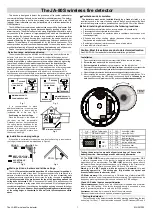
Subject to change without notice
22
or CHP)
displayed in the readout can be overwritten
and changed to the opposite mode. This is carried out
by simultaneously pressing and holding the
CHI (22)
and
the
DUAL (23)
pushbutton.
STORAGE MODE ONLY
The time deflection ranges are different in storage mode
and therefore must be considered (
please note item
(7)
). In
DUAL
mode a selection between
alternate
or
chopped
signal capture is
neither required nor
possible
. Consequently the readout does not display
such information
(ALT, CHP)
.
In
XY
storage mode the
TIME/DIV.
knob is still active.
It is used to determine the sampling rate, which is then
displayed by the readout.
(30) A/ALT-
B -
Pushbutton with multiple function.
The instrument contains two time bases designated
A
and
B
. With the aid of the
B
time base, signal parts
displayed by the
A
time base can be expanded in X
direction. The expansion ratio depends on the time
deflection coefficient ratio of both time bases (i.e.
“A:
100µs”
,
“B:1µs” = 100
). With higher expansion ratios
the
B
time base trace intensity reduces if analog mode
is active.
SINGLE (SGL)
event signal capture mode is enabled in
A
time base mode only.
A/ALT
function
:
Each time the
A/ALT- B
pushbutton is briefly pressed,
the time base mode changes in the sequence
A
–
alternate
-
A
.
A
In
A
time base mode the
TIME/DIV. (29)
control knob
is operative only for this time base. The readout then
only displays the
A
time coefficient. The time base
settings for this condition are stored if the time base
mode is changed.
ALT
If
alternate
(ALT)
time base mode is selected, the
TIME/DIV (29)
knob only controls the
B
time base.
The alternate time base mode is a sub function of the
B
time base mode where both time base traces are
displayed. Consequently the readout displays both time
deflection coefficients (e.g.
“A:100µs B:1µs”
). Unlike
the former
A
time base mode, an intensified sector is
also visible on the
A
trace. This sector indicates the signal
part which is displayed by the
B
time base. The
intensified segment can be shifted horizontally by the
DEL. POS. (28)
control knob continuously (if the B time
base is operated in free run conditions). The difference
between the start of the
A
time base trace and the
beginning of the intensified sector shows the delay time.
This information is also displayed in the readout as an
approximate value (e.g.
“Dt:2.5ms”
) related to the
calibrated
A
time coefficient (uncalibrated i.e.
“Dt>
2.5ms”
). The width of the segment decreases when
the B time coefficient is set to a lower value (higher
time deflection speed).
Alternate time base mode causes the display to alter
between
A
and
B
time base after each sweep (analog
mode). In alternate
DUAL
mode the sequence is channel
I with
A
time base,
channel I
with
B
time base,
channel
II
with
A
time base and
channel II
with
B
time base.
For better reading, the vertical position of the
B
trace
position can be shifted (
please note “TRS” (13)
).
B
function
:
Pressing and holding the pushbutton switches over from
A
or
alternate
time base mode to
B
time base mode
and vice versa.
In
B
time base mode the display of the
A
trace(s), the
intensified sector(s) and the
A
time coefficient display
in the readout are disabled. As the trace separation
(TRS)
is no longer required under these circumstances, this
function is switched off too. Consequently only the
B
time coefficient is displayed by the readout.
Briefly pressing the pushbutton switches
B
time base
mode off and
A
time base mode on. Pressing and holding
the pushbutton switches over from
B
to
alternate
time
base mode.
STORAGE MODE ONLY
In the combination of storage mode and
alternate
or
B
time base operation, the pre- and post trigger are
automatically switched off. The
PTR (8) pushbutton
is
deactivated and instead of a pre- or post trigger value
the readout displays the delay time.
ROLL
mode is not available in
alternate
or
B
time base
mode.
(31) DEL. TRIG.
VAR. -
Pushbutton with double function.
DEL. TRIG.
function
:
ANALOG MODE ONLY
Each time the pushbutton is briefly pressed, the instrument
switches between free run (untriggered) and triggered
B
time base, if
alternate
or
B
time base mode is present.
DIGITAL MODE ONLY
In contrast to analog operation the
B
time base can not
be triggered in
alternate
time base mode.
ANALOG and DIGITAL MODE
The actual setting is displayed in the readout. Instead of
the approximate delay time (
“Dt:...”
) in free run mode,
the readout displays
“DTr: slope, DC (trigger coup-
ling)”
in triggered delay mode. In this mode, the former
A
time base trigger settings regarding the trigger mode
(automatic or normal), -coupling, -slope and -level
settings are stored but still active.
With the activated delay trigger the instrument is
automatically set to normal
(NM)
trigger mode and
DC
Controls and Readout
















































